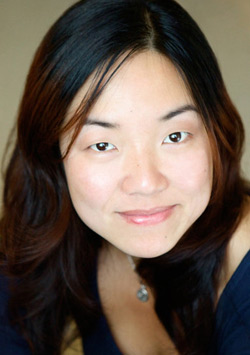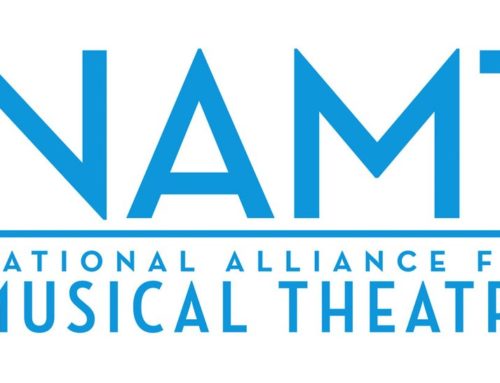(This post is a part of the Diversity & Inclusion blog salon led by Online Curator Jacqueline E. Lawton for the 2013 TCG National Conference: Learn Do Teach in Dallas. Check out further Diversity & Inclusion interviews on Jacqueline’s blog.)
TCG Online Conference Salon: Diversity and Inclusion Program Arc–Asian American Theatre series
JACQUELINE LAWTON: First, tell me about the work you do as a theatre artist or administrator.
DC: My name is Desdemona Chiang. I am a freelance stage director working primarily on the west coast. The bulk of my body of work revolves around new plays and new play development, and I’m currently on a quest to expand my work to involve classical plays (both western and non-western).
JL: How do you identify in terms of race, ethnicity, culture, and heritage? How has this identity influenced the work that you do?
DC: In the theatre, I self-identify as an “Asian American director,” but when people ask me what ethnicity I am, I say “Chinese.” That discrepancy never occurred to me until just now. There’s a difference between what I consider my own personal heritage and how I choose to label myself professionally. I think it’s because there exists this accepted genre of theatre (not to mention an entire breadth of academic socio-political-ethno science) labeled as “Asian American,” which is what I gravitated to as a convenient way of plugging into a working identity. Strangely enough, I’ve never called myself Chinese American (either personally or professionally), even though that is technically the most accurate descriptor of my race.
Every individual has a certain lens or perspective on things, which I think is reflected in his or her work. It’s part of the whole being-an-artist thing. And so I think my Chinese-ness is subliminally imprinted on everything I do (as well as my female-ness). I’ve only worked on a small handful of Asian themed plays, so it’s not really about content. My perspective comes mostly from the point of view of an immigrant—I was born in Taiwan, but grew up in the United States. I feel estranged from my home country and not entirely assimilated into this one—so everything I do has a tinge of “outsider-ness” to it, where things feel both familiar and strange.
JL: How has this identity impacted your ability to work in the American Theatre? Have certain opportunities been made available to you owing to “who” you are? Have certain doors been closed to you?
DC: For a long time, I avoided Asian American theatre like the plague. I was determined to out-white the white guys, to prove that I was no different from them—that I could play ball with the boys. And to be perfectly honest, to this day I rarely pursue Asian American work. I don’t really need to—that work tends to come my way inevitably (which is not at all a bad thing), and I happily accept it when it does. I think for the most part, theatre companies look for cultural authentication when they can, so if there’s an Asian play they want to work on, chances are, if they know me, I’ll at least make the short list. (I’ve yet to be hired to do a Shakespeare, which I suspect has less to do with my race, and more to do with my age and my body of work.)
Am I doing a disservice to my culture by not actively stepping up as a spokesperson for the Asian American theatre community? Does this make me a race traitor? I don’t know. Maybe? Sometimes I feel a little guilty about it.
It’s like I want it both ways. I expect to get considered for the Asian plays (and will probably throw a hissy fit if a white director got the job, because what the fuck do white people know about the Asian experience?), AND I want to get considered for the dead white guy plays (because they’re supposed to be “universal” and “accessible,” right?).
And to make things even more complex, at what point are you just “close enough”?
I was recently hired to direct the premiere of a new English translation of a Japanese play at a small private university. And when I was offered the job, I had this moment of thinking—Huh. I guess being Chinese is close enough? They were looking for a director with new work / dramaturgical experience and a strong visual aesthetic, and they were really impressed with my portfolio. But, frankly, I don’t understand Japanese theatre any more than I understand Latino theatre, or Black theatre. And no one on the production team really seemed to mind. The show ultimately turned out fine, but the entire time I was working on the project, I would vacillate between the following feelings.
(1) I am so grateful to be working on this play. I am learning so much.
(2) Somewhere out there, there’s a Japanese director with similar credentials as me who probably understands this script a little better than I do.
(3) If this project was a new translation of a Chinese play and a non-Chinese director was directing it, I’d be pretty pissed.
At what point do we feel comfortable authenticating for something, versus what others are comfortable having us authenticate?
In end, though, I think it’s really a matter of taste. So-and-so artistic director likes me or likes my work, so they hire me. That’s pretty much it. And yeah, sometimes it’s a cultural bias. Heck, sometimes it’s a cultural bias because hiring me DEFIES cultural biases—how’s THAT for a catch 22? It becomes a bit dangerous when we start drawing observations about social issues based on the decisions or personal preferences of individuals.
JL: Do we need racial, ethnic and gender based culturally specific theaters? What is gained by having stories of a certain community told by artists of that community?
DC: I think so, because for me, theatre is about representation and communication. And oftentimes that means giving space to acknowledge those who are not in positions of privilege. Social considerations aside, I think the theatre is a place for expression—and having a theatre whose mission is defined by a culture is no different from having a theatre who is defined by a particular style or genre of work. Some people might consider it self-ghettoizing, but I don’t see it that way.
(A sidebar on the term “Asian American Theatre”: The history of the Chinese in America is different from the Japanese, which is different from Korean, Vietnamese, Laotian, Indian, etc. And yet we’re all clumped together under this genre of Asian American theatre, as if we could merge all our heritages into one homogeneous lump. I can see it making a kind of economic sense and a creating a feeling of solidarity amongst peers, but it’s still incredibly reductive as a term and concept.)
JL: What is the current state of Asian American Theatre? (This can address recent offences and/or great accomplishments.)
DC: Okay, this might get me into a bit of trouble, but it’s what I think at the moment. I’m about to make some sweeping generalizations and assumptions:
Last year, I saw Oregon Shakespeare Festival’s production of Party People, which was Universes’ hip-hop show about the Black Panthers. It was a gritty, muscular and raw performance that was so full of joy, pain, sweat, and LIFE. I saw an entire race/culture/ethnicity/people crying out for revolution and change and demanding to be heard, and I just thought—WOW. Theses guys are not fucking around.
And then I thought: Huh. Why am I not seeing plays like this about the Asian American experience? I know we have stories not unlike this in our history, so why aren’t we putting our blood and guts out there like they are?
I think Asians are culturally conditioned to assimilate rather than speak. I don’t know where it comes from or why, but we have a visibility problem. We’re here, we’ve BEEN HERE, but no one talks about us. Or we don’t talk about ourselves—at least, not very loudly. I’ve always felt that Asian Americans were this ever-present but invisible (or neglected?) group in the American theatre. We just kinda did our thing and didn’t make a fuss about it—it was for us, by us, about us.
But lately, I’ve started to notice (as Al Heartley so eloquently put it in his recent TCG blog post) this “multiplicity” of works in mainstream theatre companies involving Asian Americans. In the San Francisco Bay Area, we saw productions ofChinglish and The White Snake at Berkeley Rep, The Hundred Flowers Projectat Crowded Fire Theatre Company, and Stuck Elevator at A.C.T., all within the span of a couple of years. The Magic Theatre recently produced the Asian Explosion 2012, which was a festival celebrating new works by Asian and South Asians in the theatre. I’m seeing more new plays by Asian and mixed race writers of Asian descent being given readings and workshops. And I’m feeling this groundswell of awareness of Asian Americans being legitimized as artists and creators in this country, which is something I personally haven’t felt before.
Yes, there are problems with representation, like La Jolla’s The Nightingale or the RSC’s Orphan of Zhao, but it’s remarkable how interest in the presence of Asian and Asian Americans have increased in the last few years. These problems are getting attention because these major companies—who have been traditionally euro-centric and white for decades—are now choosing to include a different and new genre of work that involves a whole new demographic of people. And part of me thinks that because this is a kind of uncharted territory for companies of this size and reputation, yeah, sure, they’re going to be a bit unaware of things like racial parity and sensitivity. They just don’t know any better right now. But the programming gesture is a significant step. So I think we need to be patient. And see the progress for what it is, and to not get frustrated when we see these same mistakes get made over and over again, because it takes time for people to get it. And we’re going to have the same conversation over again. And change will happen, slowly but surely.
So, this is where I say (again) to the producers and artistic directors out there:
Guys, you gotta hire Asian people to do the Asian plays. And I’m not just talking about casting. I’m talking about the invisible people—designers, directors, stage managers, production assistants and interns. And sometimes you gotta hire Asian people to do the non-Asian plays. And someday, it’ll be OK to hire non-Asian folks to do the Asian plays, but not now. I know most of you do it anyway, but really, it’s not OK. Someday, we’ll get to a place where every programming or casting decision won’t be considered either pandering or some kind of mini victory or defeat—it’ll just be so. But that day isn’t today.
(You can also replace the word “Asian” with “Latino,” “Black,” “Native American,” “Gay,” “Female,” and any other non-privileged demographic in the current socio-political climate.)
The downside is, I think that in the process of becoming more visible in mainstream theatre, Asian American Theatre as a social movement is starting to dwindle. It could be a generational issue. It could be a shift in the social paradigm of our cultures as the decades go by. It could be founders’ syndrome. I’m also speaking from the perspective of someone who was never actively involved in the Asian American Theatre movement, so my perspective might be inaccurate.
So, this is a long and winded way of saying that I think we’re making progress and we’re getting there. It’s slow, but it’s happening.
JL: What can theatres do to better serve a larger and more inclusive community?
DC: The bigger question for me is—do theatres actively WANT to commit to serving a larger and more inclusive community? Of course, no theatre is going to be like—“nah, I just want aging white folks in my theatre,” that’s not what I’m saying. But terms like “diverse” and “inclusive” are incredibly well-meaning, but also vague and ineffective. They sound good on paper and on mission statements, but ultimately don’t help generate results. Because, in the end, who DOESN’T want more diverse audiences? No theatre is going to turn any new audience demographics away. But that’s just accepting good karma when it comes along. You cast out a wide net by programming plays by different writers of color or female writers and hope that new groups people will respond. It’s a passive way of being inclusive, but it’s valid, and I think it’s how the majority of theatres operate.
If you want to aggressively reach out to new audiences and demonstrate a commitment to those people, I think that you have to articulate goals and target demographics. And that means being specific, which probably feels counterintuitive and scary, because specificity implies exclusivity. And I think the fear of being exclusive often hinders the ability to be productively inclusive.
When a theatre says, “I want to be more inclusive in my programming and values,” the first thing I want to ask is—WHO do you want to reach out to? And WHAT does your theatre want to do for those people? To what end? So, for me, it’s a matter of focus and intention. Tell me who you want to serve, and what that service looks like.
Desdemona Chiang is a freelance stage director and Co-Founder of Azeotrope (Seattle). Directing credits include: Crowded Fire Theatre Company, Azeotrope, Impact Theatre, FringeNYC, Playwrights Foundation, Golden Thread Productions, Washington Ensemble Theatre, Unicycle Collective, SIS Productions, and Cornish College of the Arts. Assistant Directing/Dramaturgy: Oregon Shakespeare Festival, Playmakers Repertory Company, ACT Seattle, Arizona Theatre Company, and Rattlestick Playwrights Theatre. Alumnus: Drama League Directing Fellow, SDC Sir John Gielgud Directing Fellow, TCG Young Leader of Color, Lincoln Center Theater Directors Lab and Directors Lab West. Associate Member: Stage Directors and Choreographers Society (SDC). BA, Integrative Biology and Theatre, Dance & Performance Studies: University of California at Berkeley. MFA Directing: University of Washington.
 Jacqueline E. Lawton received her MFA in Playwriting from the University of Texas at Austin, where she was a James A. Michener fellow. Her plays include Anna K; Blood-bound and Tongue-tied; Deep Belly Beautiful; The Devil’s Sweet Water; The Hampton Years; Ira Aldridge: Love Brothers Serenade, Mad Breed and Our Man Beverly Snow. She has received commissions from Active Cultures Theater, Discovery Theater, National Portrait Gallery, National Museum of American History, Round House Theatre and Theater J. A 2012 TCG Young Leaders of Color, she has been nominated for the Wendy Wasserstein Prize and a PONY Fellowship from the Lark New Play Development Center. She resides in Washington DC and is a member of Arena Stage’s Playwrights’ Arena. jacquelinelawton.com
Jacqueline E. Lawton received her MFA in Playwriting from the University of Texas at Austin, where she was a James A. Michener fellow. Her plays include Anna K; Blood-bound and Tongue-tied; Deep Belly Beautiful; The Devil’s Sweet Water; The Hampton Years; Ira Aldridge: Love Brothers Serenade, Mad Breed and Our Man Beverly Snow. She has received commissions from Active Cultures Theater, Discovery Theater, National Portrait Gallery, National Museum of American History, Round House Theatre and Theater J. A 2012 TCG Young Leaders of Color, she has been nominated for the Wendy Wasserstein Prize and a PONY Fellowship from the Lark New Play Development Center. She resides in Washington DC and is a member of Arena Stage’s Playwrights’ Arena. jacquelinelawton.com



